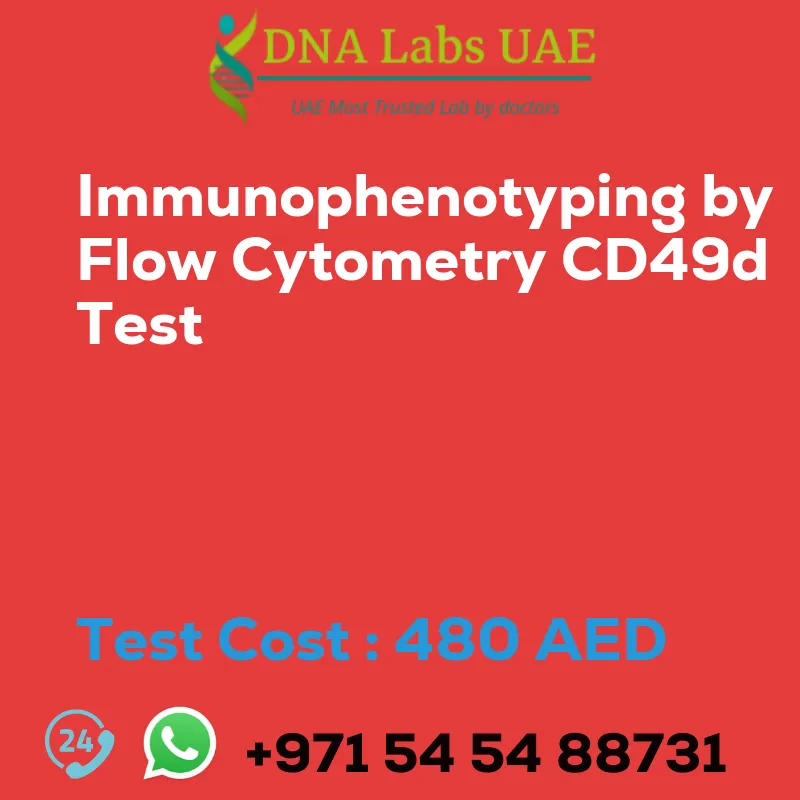IMMUNOPHENOTYPING BY FLOW CYTOMETRY CD49d Test
Test Name: IMMUNOPHENOTYPING BY FLOW CYTOMETRY CD49d Test
Components: CD49d antibodies
Price: 480.0 AED
Sample Condition: 3 mL (2 mL min.) whole blood in 1 Green Top (Sodium Heparin) tube AND 2 mL (1 mL min.) Bone marrow in 1 Green Top (Sodium heparin) tube. Ship immediately at 18-22°C. DO NOT REFRIGERATE OR FREEZE. Specify time, date, and clinical details on the test request form.
Report Delivery: Sample Daily 9 am; Report Same day
Method: Flow Cytometry
Test Type: Cancer
Doctor: Hematologist, Oncologist
Test Department: FLOW CYTOMETRY
Pre Test Information: Give brief clinical history.
Test Details:
CD49d is a cell surface marker that is commonly used in flow cytometry immunophenotyping to identify and characterize different cell populations. CD49d, also known as integrin alpha-4, is a subunit of the VLA-4 (Very Late Antigen-4) heterodimeric cell adhesion molecule. It is expressed on various cell types, including lymphocytes, monocytes, and granulocytes.
The CD49d test involves the use of fluorescently labeled antibodies specific to CD49d. These antibodies are conjugated to different fluorochromes, allowing for the simultaneous detection of multiple markers on a single cell. The cells of interest are incubated with the CD49d antibody, which binds specifically to the CD49d antigen on the cell surface.
After incubation, the cells are washed to remove any unbound antibody, and then analyzed using a flow cytometer. The flow cytometer passes the cells through a laser beam, and the emitted fluorescence is detected and quantified. This allows for the identification and enumeration of CD49d-positive cells within the cell population.
The CD49d test can be used to assess the expression levels of CD49d on different cell types, as well as to identify specific cell populations based on their CD49d expression profile. It is commonly used in research and clinical settings to study immune cell activation, migration, and adhesion.
In summary, the CD49d test is a flow cytometry-based immunophenotyping method that utilizes fluorescently labeled antibodies to detect and quantify CD49d expression on cells. It provides valuable information about the presence and characteristics of specific cell populations, aiding in the understanding of immune cell biology and disease processes.
| Test Name | IMMUNOPHENOTYPING BY FLOW CYTOMETRY CD49d Test |
|---|---|
| Components | |
| Price | 480.0 AED |
| Sample Condition | 3 mL (2 mL min.) whole blood in 1 Green Top (Sodium Heparin) tube AND 2 mL (1 mL min.) Bone marrow in 1 Green Top (Sodium heparin) tube. Ship immediately at 18\u0192??22?\u00f8C. DO NOT REFRIGERATE OR FREEZE. Specify time, date and clinical details on test request form. |
| Report Delivery | SampleDaily9 am; Report Same day |
| Method | Flow Cytometry |
| Test type | Cancer |
| Doctor | Hematologist, Oncologist |
| Test Department: | FLOW CYTOMETRY |
| Pre Test Information | Give brief clinical history. |
| Test Details |
CD49d is a cell surface marker that is commonly used in flow cytometry immunophenotyping to identify and characterize different cell populations. CD49d, also known as integrin alpha-4, is a subunit of the VLA-4 (Very Late Antigen-4) heterodimeric cell adhesion molecule. It is expressed on various cell types, including lymphocytes, monocytes, and granulocytes. The CD49d test involves the use of fluorescently labeled antibodies specific to CD49d. These antibodies are conjugated to different fluorochromes, allowing for the simultaneous detection of multiple markers on a single cell. The cells of interest are incubated with the CD49d antibody, which binds specifically to the CD49d antigen on the cell surface. After incubation, the cells are washed to remove any unbound antibody, and then analyzed using a flow cytometer. The flow cytometer passes the cells through a laser beam, and the emitted fluorescence is detected and quantified. This allows for the identification and enumeration of CD49d-positive cells within the cell population. The CD49d test can be used to assess the expression levels of CD49d on different cell types, as well as to identify specific cell populations based on their CD49d expression profile. It is commonly used in research and clinical settings to study immune cell activation, migration, and adhesion. In summary, the CD49d test is a flow cytometry-based immunophenotyping method that utilizes fluorescently labeled antibodies to detect and quantify CD49d expression on cells. It provides valuable information about the presence and characteristics of specific cell populations, aiding in the understanding of immune cell biology and disease processes. |







